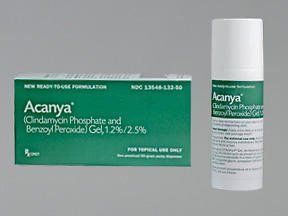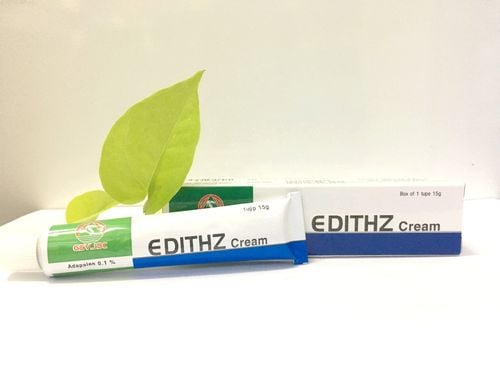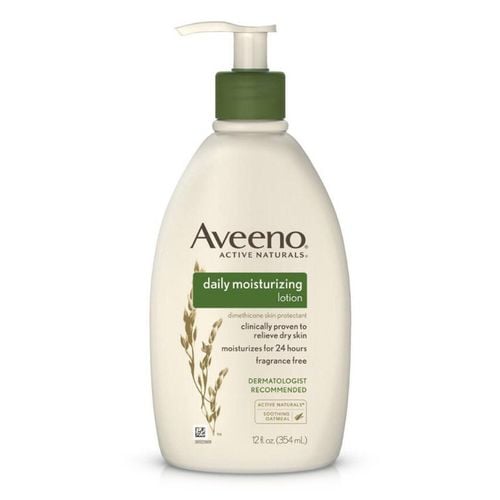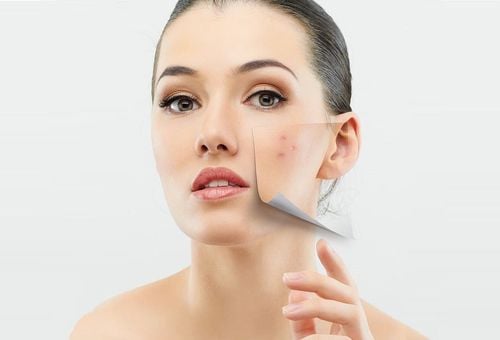This is an automatically translated article.
Sunlight causes negative effects on the skin such as: increasing the risk of skin cancer, premature aging and hyperpigmentation. Therefore, it is very important to use sunscreen to avoid the harmful effects of UV rays. So should acne skin use sunscreen or not?
1. Should acne skin use sunscreen?
According to dermatologists, acne-prone skin still needs sunscreen. When exposed to infrared heat from the sun, acne flares up even more. Heat is harmful and can irritate your skin. On the other hand, the skin will become hyperpigmented when exposed to the sun due to the production of melanin, causing acne scars to become worse.2. Use sunscreen properly for acne skin
2.1. Choosing the right sunscreen for acne-prone skin
For women with acne-prone skin, it is often difficult to find the right sunscreen. Because using the wrong sunscreen product can cause skin irritation leading to more acne. Another reason why people with acne and oily skin hate sunscreen is that it often makes skin oily and breakouts.
Fortunately, there are many sunscreens available on the market that don't clog pores and leave skin looking brighter. For oily and acne-prone skin, you should use a liquid, gel or spray sunscreen. Because they are in the form of water, they will be easily absorbed completely into the skin without leaving a creamy streak.
MORE: Should I use a physical sunscreen or a chemical sunscreen?

Lựa chọn kem chống nắng phù hợp với da mụn sẽ giảm kích ứng da
2.2. Look for sunscreen products labeled oil-free and hypoallergenic
If you have oily or acne-prone skin, you should give priority to choosing an oil-free sunscreen to help prevent your face from becoming oily. Women can look for the term "noncomedogenic" in the label of a sunscreen. The meaning of this phrase is that the product does not contain pore-clogging ingredients to ensure you won't get breakouts when using them.
Also, you should not use body sunscreen to apply on your face. Because body sunscreens often have a heavy and greasy texture, it is easy to cause acne.
2.3. Choose a sunscreen with SPF 30 or higher
SPF, also known as Sun Protection Factor, is a way to measure protection from UVB rays. The higher the SPF, the more protection the skin from the sun's effects.
The American Academy of Dermatology recommends using a sunscreen with an SPF of at least 30 or higher every day that will block about 97% of UV rays. Accordingly, women should apply sunscreen every day for the best protection, even when it is cloudy or rainy.
MORE: How to choose sunscreen for oily skin
2.4. Stay away from Oxybenzone and PABA found in sunscreens
Sensitive skin or problems such as eczema, psoriasis should stay away from sunscreens containing oxybenzone and PABA active ingredients, because they are both capable of irritating the skin. Instead, you should use a sunscreen of natural origin. These products use titanium dioxide or zinc oxide as the active ingredient, which is less irritating to the skin than other sunscreen ingredients.

Chị em bị da mụn không nên thoa kem chống nắng Oxybenzone và PABA
2.5. Consider using a moisturizer that contains sunscreen
The addition of sunscreen to moisturizer means shortening the multi-layer skin care routine. Therefore, you will save more time and cost. A moisturizer-sunscreen product has the same sun protection effect as a standalone sunscreen. However, you should still choose a sunscreen with at least SPF 30 and broad spectrum protection.
According to experts, these lotions are not effective enough to keep your skin all day at the beach or pool. So, choose a product that is waterproof and sweat-proof and make sure to apply it every 2 hours or every 40 minutes while swimming or sweating.
MORE: Know how to read the symbols to choose the right sunscreen
2.6. Use your sunscreen along with acne treatment products
If you are worried whether to use sunscreen with acne products, the answer is yes. You can apply an acne medication first. Then wait about 20 minutes or until the medicine is completely absorbed, then you can apply sunscreen as usual.
In short, sunscreen is important for all skin types. Depending on your skin type and intended use, you should choose the right sunscreen. For example, office workers who are less exposed to the sun will have a lower need for sunscreen than those who regularly work outdoors. The longer you spend outdoors, the more you should have a sunscreen that is water and sweat resistant.
Please dial HOTLINE for more information or register for an appointment HERE. Download MyVinmec app to make appointments faster and to manage your bookings easily.
References: slmdskincare.com, webmd.com, verywellhealth.com













